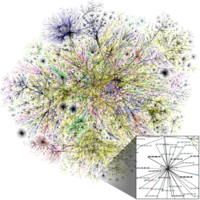
Photo from wikipedia
Airbnb as an online short-term rental marketplace has had significant impact on the housing dynamics of major metropolitan regions. This work examines Airbnb's relationship with urban residential displacement through the… Click to show full abstract
Airbnb as an online short-term rental marketplace has had significant impact on the housing dynamics of major metropolitan regions. This work examines Airbnb's relationship with urban residential displacement through the dual phenomena of neighborhood gentrification as the loss of low-income households along with neighborhood exclusion as the preservation of elite enclaves without affordable housing options available to low-income households. I feature approximately 15 thousand unique San Francisco Airbnb listings spanning from 2016 to 2021 to investigate how Airbnb hosts employ cultural rhetoric associated with urban displacement to advertise their units' neighborhoods. I employ a computational mixed-methods design by combining natural language processing techniques with qualitative content analysis to examine how hosts differ in their cultural representations of their listing's neighborhoods by its relationship with residential displacement. My findings highlight the pervasiveness of rhetoric focusing on the authenticity and diversity of gentrifying neighborhoods contrasted to the safety and family-friendliness of exclusionary neighborhoods as a key strategy Airbnb hosts use to commercialize their listings. These findings underscore the reinforcing dynamics between regional Airbnb markets and urban displacement, with subsequent implications towards the ongoing marginalization of longstanding residential communities within contemporary cities.
Journal Title: Proceedings of the ACM on Human-Computer Interaction
Year Published: 2022
Link to full text (if available)
Share on Social Media: Sign Up to like & get
recommendations!